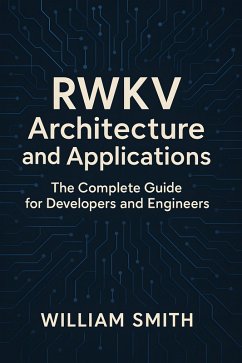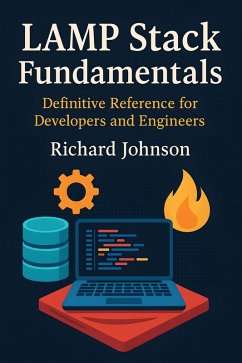
Fundamentals of Microcontroller Architecture and Applications (eBook, ePUB)
Definitive Reference for Developers and Engineers

PAYBACK Punkte
0 °P sammeln!
"Fundamentals of Microcontroller Architecture and Applications" "Fundamentals of Microcontroller Architecture and Applications" is a comprehensive reference that bridges foundational theory with modern engineering practice in microcontroller design and embedded system development. Meticulously structured, the book opens with a sweeping historical perspective, contextualizing the evolution of microcontrollers against technological milestones and industry dynamics. Readers are introduced to core architectural distinctions, the pivotal roles played by microcontrollers in embedded and real-time sy...
"Fundamentals of Microcontroller Architecture and Applications"
"Fundamentals of Microcontroller Architecture and Applications" is a comprehensive reference that bridges foundational theory with modern engineering practice in microcontroller design and embedded system development. Meticulously structured, the book opens with a sweeping historical perspective, contextualizing the evolution of microcontrollers against technological milestones and industry dynamics. Readers are introduced to core architectural distinctions, the pivotal roles played by microcontrollers in embedded and real-time systems, and the regulatory frameworks shaping today's commercial ecosystem.
Diving deep into technical territory, the book systematically unpacks the intricate anatomy of microcontrollers, covering instruction set architectures, CPU pipelines, memory hierarchies, and crucial on-chip resources such as analog and digital interfaces, timers, communication blocks, and advanced security engines. Special emphasis is given to contemporary trends including low-power strategies, integration of cutting-edge peripherals, and architectural considerations for reliability and scalability. Stepwise, the text walks readers through programming models, from assembly and C/C++ to modern toolchains, firmware architecture, and real-time operating system integration, all while providing actionable insights into debugging, performance analysis, and robust software design.
The later chapters broaden the focus to address system-level integration, digital and analog interfacing, reliable networking, and state-of-the-art security and safety methodologies. Exploration of emerging domains-such as open-source hardware (RISC-V), edge AI and machine learning, energy harvesting, and quantum-safe security-underscores the book's value for both students and practicing engineers. Through its rigorous yet accessible approach, this volume provides an indispensable foundation and modern vision for anyone designing, implementing, or managing microcontroller-based systems in an evolving technological landscape.
"Fundamentals of Microcontroller Architecture and Applications" is a comprehensive reference that bridges foundational theory with modern engineering practice in microcontroller design and embedded system development. Meticulously structured, the book opens with a sweeping historical perspective, contextualizing the evolution of microcontrollers against technological milestones and industry dynamics. Readers are introduced to core architectural distinctions, the pivotal roles played by microcontrollers in embedded and real-time systems, and the regulatory frameworks shaping today's commercial ecosystem.
Diving deep into technical territory, the book systematically unpacks the intricate anatomy of microcontrollers, covering instruction set architectures, CPU pipelines, memory hierarchies, and crucial on-chip resources such as analog and digital interfaces, timers, communication blocks, and advanced security engines. Special emphasis is given to contemporary trends including low-power strategies, integration of cutting-edge peripherals, and architectural considerations for reliability and scalability. Stepwise, the text walks readers through programming models, from assembly and C/C++ to modern toolchains, firmware architecture, and real-time operating system integration, all while providing actionable insights into debugging, performance analysis, and robust software design.
The later chapters broaden the focus to address system-level integration, digital and analog interfacing, reliable networking, and state-of-the-art security and safety methodologies. Exploration of emerging domains-such as open-source hardware (RISC-V), edge AI and machine learning, energy harvesting, and quantum-safe security-underscores the book's value for both students and practicing engineers. Through its rigorous yet accessible approach, this volume provides an indispensable foundation and modern vision for anyone designing, implementing, or managing microcontroller-based systems in an evolving technological landscape.
Dieser Download kann aus rechtlichen Gründen nur mit Rechnungsadresse in A, B, BG, CY, CZ, D, DK, EW, E, FIN, F, GR, H, IRL, I, LT, L, LR, M, NL, PL, P, R, S, SLO, SK ausgeliefert werden.













